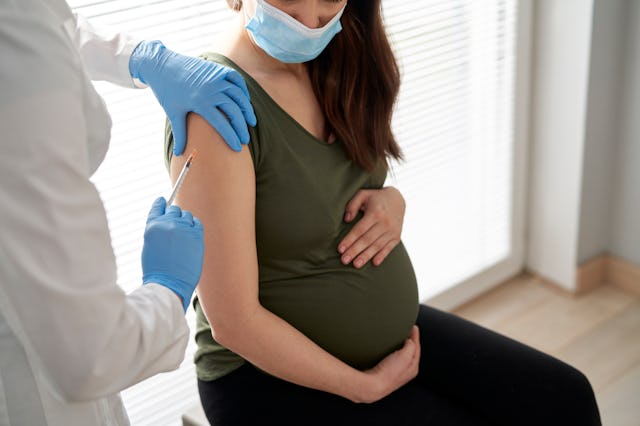Getting A COVID-19 Vaccine While Pregnant Helps Protect Your Baby
A new study out of Norway has found that getting vaccinated while pregnant lends at least four months of virus protection to new babies.

Getting vaccinated for COVID-19 while pregnant may likely do more than protect mom and baby before the birth. A new study out of Norway has found that getting a second or third shot of either the Pfizer or Moderna vaccine when expecting lends extended protection for infants.
The study, published this week in JAMA Internal Medicine, tracked 9,739 babies of moms who received a second or third shot while pregnant and 11,904 babies of expectant moms who did not. The four-month study found that the risk of a positive PCR test was 71% lower during the Delta spike and 33% lower during the Omicron spike for the babies whose moms got the jab.
While all of the babies were in Norway, researchers believe the study’s findings will hold up elsewhere, especially since a U.S. study had similar findings.
"We believe our study results are generalizable to other pregnant populations,” the study states. “This assumption is strengthened by the fact that the findings align with the results from the US study examining maternal COVID-19 vaccination and risk of infant hospitalization for COVID-19."
One researcher also noted that protection could last even longer than the findings suggest.
"There could still be a protective effect from antibodies past the first four months, but there are likely individual differences," Ellen Oen Carlsen, MD, of the Norwegian Institute of Public Health told Reuters.
The study’s authors added that some babies may have received even greater protection from the virus from their mother’s breastmilk — though that angle of protection was not explored in this particular research.
It’s also worth noting that the rate of COVID-19 infections in the infants was rare overall — as was the rate of hospitalization — which was 0.07 percent in both groups.
This news means that parents can help bridge the gap between when their baby is born and when their baby can receive vaccination outside the womb — a possibility that is likely on its way later this month.